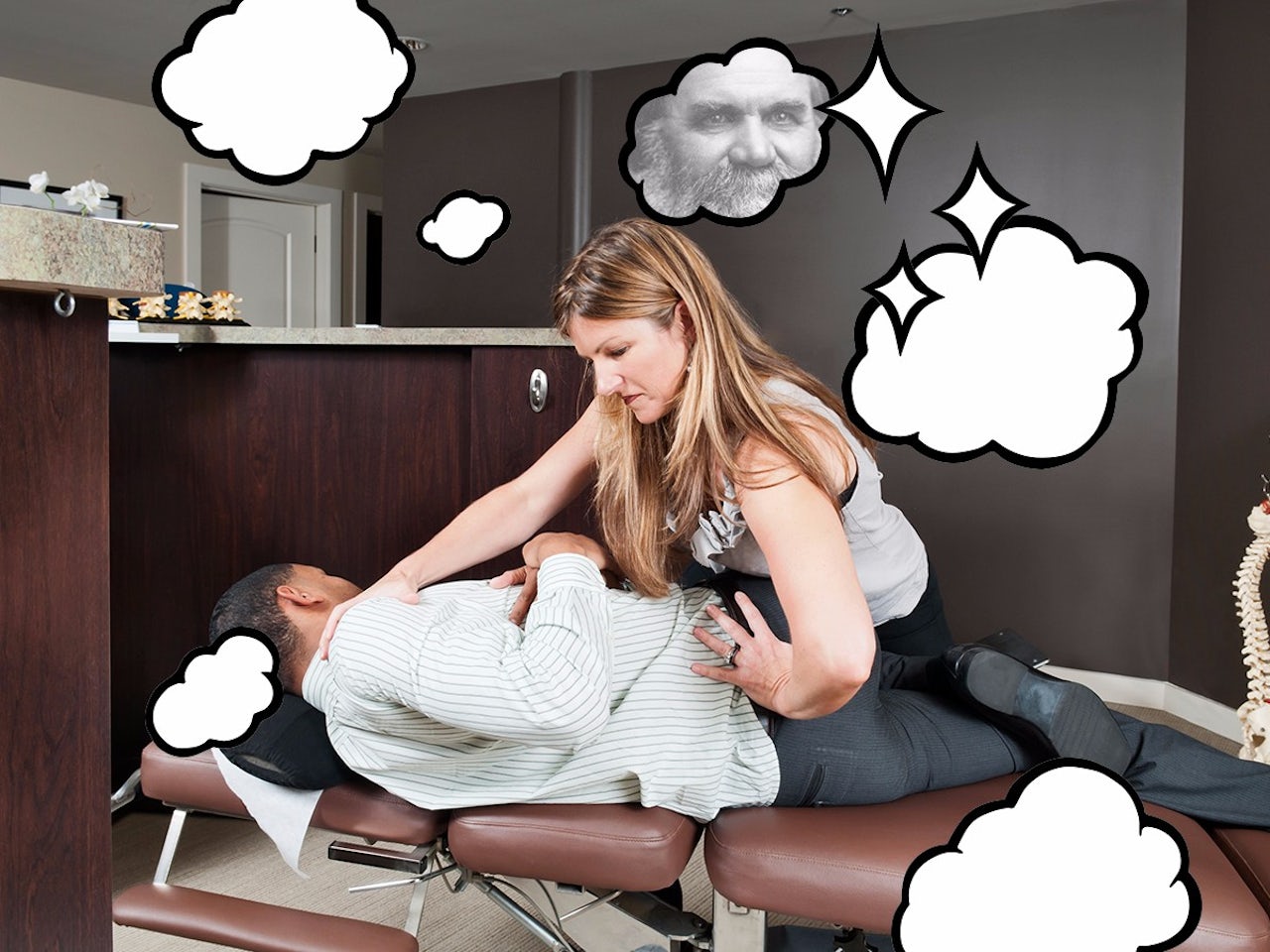Why Go to a Chiropractor Funny
The first time I dealt with a chiropractor was in 1999 at a mall kiosk, which seemed like an odd place to encounter a medical professional. I was a teenager working a few storefronts down selling butterfly clips, and I made the mistake of looking at one of the kiosk's spinal models. The chiropractor on duty promptly came over to let me know how he could fix all my health ailments. Back issues! Period pain! Even weight loss! Whatever was ailing me, this chiropractor was on it.
The problem with his sales pitch? I was in perfect health. Nevertheless, he persisted.
Despite his enthusiasm for fixing me, I was skeptical. Who the hell peddles (real) medicine out of a kiosk? Brain surgeons and oncologists aren't at the mall trying to drum up new business from vulnerable passersby. What could a chiropractor do for me?
If you're one of the approximately 80 percent of Americans who have suffered from back pain, you may have been referred to a chiropractor for medical help. In the modern-day internet landscape, you'll find chiropractic celebrities like Dr. Josh Axe (1.7 million Facebook followers), Dr. Billy DeMoss (20,000 Facebook followers), and Dr. Eric Berg (472,000 YouTube subscribers) giving advice that goes beyond managing spinal issues. Both in their offices and on social media, chiropractors have adapted to a marketplace that's demanding more than just pain management: they extol the virtues of an "alkaline diet," tell you how to manage stress with detoxing, and wax scientific about the adrenal gland (which, last I checked, isn't in the goddamn spine). Though many patients rely on chiropractors to manage chronic back or neck pain, others delegate overall health maintenance to chiropractic care — to the joy of the chiropractic community and the possible detriment of humanity. Some chiros have gone as far as to adjust the spines of newborn babies, saying that this does everything from alleviating "birthing trauma" to stimulating the immune system to the point where the little ones don't need to get vaccinated.
Which should all make you wonder: does any of it work?
No. It's absolute bullshit.
Chiropractic care, I'm sorry to say, is little more than the buffoonery of a 19th-century lunatic who derived most of his medical theory from séances. It has not evolved much since its creation. Chiropractic beliefs are dangerously far removed from mainstream medicine, and the vocation's practices have been linked to strokes, herniated discs, and even death. Chiropractors can't replace your doctor, and I'm amazed that they're still even allowed to practice. You shouldn't trust them with your spine or any other part of your body, and here's why.
It all started with a séance...
As the legend goes, chiropractic medicine was born on September 18, 1895, when Daniel David Palmer, a magnetic healer in Davenport, Iowa, met a deaf janitor named Harvey Lillard. Palmer claimed they had a conversation about how Lillard's hearing could be repaired by adjusting his spine, and with a crack of the back, the janitor's auditory woes were cured. This was the launching point for the pseudoscience of chiropractic (how the practice of chiropractic medicine is commonly referred to). From there, Palmer continued to work on his theories, eventually opening up chiropractic schools that still exist to this day (yearly tuition at the Palmer College of Chiropractic in Iowa: $34,000. Acceptance rate: 100 percent), and the field of chiropractic medicine emerged.
If you didn't already have doubts about chiropractic, I hope your eyebrows were at least raised a little bit by the tale of a deaf janitor having an in-depth conversation about emerging medical theories with a magnetic healer in late 19th-century Iowa. It's possible that Lillard never consented to the procedure Palmer performed on him; some re-tellings speculate that Lillard was not fully deaf. But it's more likely that, because there are no nerves in the back that can actually affect hearing, Lillard's condition was not fixed with a back adjustment.
Though some chiropractors are now making an effort to introduce evidence-based practices into their treatment, chiropractic as a whole hasn't evolved like other areas of medicine — with hypotheses, experimentation, and peer review. Instead, it was birthed by a strange combination of hocus pocus, guesswork, and strongly held religious beliefs. I'm not being hyperbolic when I cite hocus pocus. Palmer held séances to contact a dead physician named Jim Atkinson, and said that those séances helped him develop chiropractic. As he wrote in his 1914 book The Chiropractor:
"The knowledge and philosophy given me by Dr. Jim Atkinson, an intelligent spiritual being, together with explanations of phenomena, principles resolved from causes, effects, powers, laws and utility, appealed to my reason. The method by which I obtained an explanation of certain physical phenomena, from an intelligence in the spiritual world, is known in biblical language as inspiration. In a great measure The Chiropractor's Adjuster was written under such spiritual promptings."
Let's burnish this quotation with some context about what medicine was like in the era in which chiropractic came into being. It would be more than five decades before it was known what was wrong with procedures like lobotomies and drugs like thalidomide. The most common causes of death were diarrhea and the flu. We didn't have proper scanning equipment to identify issues in the spine. Smoking was good for you. Bloodletting was still a thing. The life expectancy was below 50 years. It's safe to say there was an opening for a man like D.D. Palmer to emerge and tell people he could fix their problems with a fancy backrub.
Will a backrub save your life?
The defining principle of chiropractic is that health is a state that can be either maintained or lost due to vertebral subluxations. Chiropractors claim that tending to vertebral subluxations stimulates your spinal cord and nervous system, and since your spine and the attached nervous system send signals to everything in your body, if you stimulate the spine through chiropractic adjustments, you will improve the health and vitality of your entire body.
Or so they say.
Subluxation is indeed a medical term, but it's one misused by chiropractors. A subluxation means that a joint in your body pops partially out of the socket and, generally, pops back in. This can result in damage to the surrounding tissues (I know from experiencing a diagnosed shoulder subluxation that's resulted in three surgeries). Chiropractors allege that they can feel vertebral subluxations by hand. Though x-ray imaging was discovered the same year as the inception of chiropractic, it's highly doubtful that the magnetic healer Daniel Palmer would have had access to such a highly advanced technological breakthrough, and thus he identified subluxations through, well, séance science.
Yvette d'Entremont talked about chiropractic on our daily podcast, The Outline World Dispatch. Subscribe on Apple Podcasts, or anywhere else you listen to podcasts.
In the past, some chiropractors have made cagey statements about whether vertebral subluxations can be seen via x-ray; in the 1970s, Stephen Barrett, the founder of Quackwatch, contacted the Palmer School of Chiropractic to see some of its teaching files on the subject. The school replied: "Chiropractors do not make the claim to be able to read a specific subluxation from an x-ray film. [They] can read spinal distortion, which indicates the possible presence of a subluxation and can confirm the actual presence of a subluxation by other physical findings." Ohh-kay. But according to Barrett, the chiropractic community in 1972 met to determine what a subluxation was so they could receive Medicare payments. The resulting document "described the supposed x-ray manifestations of 18 types of 'subluxations'"... some of which were "fancy names for the minor degenerative changes that occur as people age." An actual joint subluxation, however, can be seen on an x-ray and the appropriate treatment generally involves a physical therapist or an orthopedic surgeon, not fancy back cracking.
In the field of chiropractic, fixing these subluxations is supposed to be the key to health. Chiropractic practitioners have been known to seriously downplay genetics or germ theory as reasons why you might get sick. Why would they? Pesky facts don't factor into their bottom line.
The medical community disavows chiropractic
If this leaves you asking "so when should I go to a chiropractor?" Well, that's like asking if you should go to a tarot card reader as a complement to your psychiatrist. Simply put: There is scant medical evidence that a chiropractor is your best treatment option for... anything.
The American Chiropractic Association has long claimed that the American Medical Association discriminates against chiropractors by limiting "patient access to care by chiropractic physicians and all other duly licensed non-M.D." But the AMA is not being discriminatory here — they are acting in the interest of their patients. Medical doctors often refer patients to the proper experts, and outside of a narrow scope of experts, this rarely includes someone who is a "duly-licensed non-M.D.," because that person's views on medicine would not be aligned with their standards of care. A doctor is not a doctor is not a doctor.
Still, there's agitation to allow medical exams performed by chiropractors into the mainstream. A recent Wisconsin bill proposed that schools would have to allow exams performed by chiropractors to fulfill sports physical requirements. This seems bad, so I asked some medical doctors for their thoughts on chiropractic.
Adam Schechner, a Bethesda-based doctor, said that even in his position as a general trauma surgeon, he doesn't "feel qualified to perform athletic physicals or identify cardiac/pulmonary problems." James A. Bishara, a pediatric cardiologist in Louisiana, doubted if a chiropractor could spot issues that typically take years of traditional medical training to identify. "Anecdotally, most med students struggle with [detecting] heart murmurs," he said. "Most start to pick up the skill after years of experience or an intensive rotation. I'm skeptical that chiropractic training has that kind of exposure to murmurs to adequately screen."
Clay Jones, pediatrician in Newton, Massachusetts, agreed. "It takes years to develop true skill assessing the heart via auscultation," he said. "But a sports physical is about more than heart defects." This is an important point — anecdotally, for a large percentage of students, a sports physical will be their only annual contact with a doctor, and those physicals can be lifesaving.
Chiropractic "celebrities" are here to scam you
Nothing has been better for the doctors who want to spread the word of chiropractic and separate you from your money than social media. On Facebook, Instagram, YouTube, and maybe even Tinder, these friendly and blandly attractive chiropractors dole out health advice that appeals to people who tend to trust the medical professional with the appearance of being smart. Those loyal to their chiropractors might say that the practitioners who rule the social media landscape are a misrepresentation of the field, but when it comes down to it, there's no difference between a chiropractor who peddles pseudoscience on Facebook and one who works in an office — they're both accredited as doctors of chiropratic.
Let's first take a look at Josh Axe. On his Facebook page, Axe, a self-described "board-certified doctor of natural medicine" who earned his doctorate in chiropractic from good old Palmer College of Chiropractic, tells you which sunscreens are "safe" and dispenses snack suggestions. "Need a sweet snack that won't unravel your health goals? We have you covered," he writes, linking to a dark-chocolate almond butter recipe that contains, by my estimate, more than 1,900 calories, depending on how much coconut sugar you use.
The posts on Axe's page run the gamut from minor bullshit, like "healthy" recipes, to major bullshit, like the pernicious claims that you can reverse cavities (you can't, and why is this guy giving dental advice?) and that you can treat some painful and potentially dangerous bacterial infections like UTIs and staph with essential oils and "antiviral herbs" (again, not so much). He also writes that "living a life of purpose" can lower dementia risk. Wouldn't that be nice? While it might not concern you that a "physician" with nearly two million followers on Facebook is spending his time posting recipes for face wash, it should pique your curiosity that he's telling people he's never met they should purchase his products to "support" any number of conditions, from "leaky gut syndrome" (not real) to aging (his bone-broth collagen formula, now available in chocolate, will set you back $37). That's a funny word, "support." It's legal speak for "this product is bullshit." Beyond his line of snake oils, it should absolutely scare you that Axe has written articles espousing his anti-vaccine views while speaking glowingly of anti-vax queen Jenny McCarthy's pediatrician. How hippocratic. That's the word, right?
Another chiropractor of social media, Eric Berg, spews his own special kind of bullshit. His favorite thing to harp on is the adrenal gland; he's sure that the biggest issue affecting Americans is not heart disease or cancer but something called adrenal fatigue syndrome. It's interesting that a chiropractor claims to know so much about this gland given that care of it usually falls to highly trained endocrinologists.
But this doesn't stop Berg from offering an endless array of advice on the subject. On YouTube, he tells his readers how to test for adrenal fatigue (if you can't hold your breath for that long and if your pupils aren't reactive to light, you might have it, or also you may be dead). He also made up a thing called "the adrenal body type," to explain why you might have a gut, because you can't just have a little belly fat like most normal people do. There must be something seriously wrong with you.
Here's the rub: adrenal fatigue isn't real. A 2016 review study published in the journal BMC Endocrine Disorders found that no evidence that supports the existence of the condition described as adrenal fatigue. Yes, the adrenal glands can develop disorders such as Cushing's Syndrome or Addison's disease, but "adrenal fatigue syndrome" is nothing but a way for Berg to make you feel like a hypochondriac.
I've saved my personal favorite celebrity chiropractor, Billy DeMoss, for last. DeMoss, a close friend of Axe, has never met a pseudoscience he didn't like. Moss firmly believes vaccines (which he has referred to as "shots of pus") are for idiots, an opinion he expressed in a rather unhinged Facebook rant about why pandemics are false flags:
...boy cries wolf again?...what happened to Zika, SARS, the pig flu?...maybe people are waking up to the false flag propaganda...vaccines will be available for the immune and IQ compromised...the idiots will line up for their shots of pus!
Oh, and he's sure that chemtrails are real.
May I remind you: This is a man who wants you to trust him with your infant's still-undeveloped skeleton. Oh yes, DeMoss is a huge proponent of childhood and infant chiropractic. "Simple chiropractic checkups now can have a lasting impact on your child's long-term health," DeMoss's website reads. "This is because chiropractic care promotes a properly functioning central nervous system and enables children to build a strong foundation of well-being. Immediate results in children often include a decrease in allergies, a reduction in sleeping disorders, and less hyperactivity." His Facebook videos, in which he manipulates the spine of a child, allege that chiropractic can help problems via stimulating the patient's spinal nerves for everything from the heart to the colon. His website also claims that chiropractic care can have a positive effect on a child's behavior, and that the "frequent" chiropractic treatment of infants can result ���in immediate quieting, improved breastfeeding, cessations of crying, muscular relaxation, and sleepiness." Which is odd, because he also somewhat paradoxically claims that kids who receive chiropractic care don't get sick. All this just from… cracking the undeveloped skeleton of fragile humans.
When a person who compares clouds to the holocaust also thinks something is good for your child, you should absolutely trust him, right?
Do not let a chiropractor near your child
How many third-graders do you know complain about chronic lower back pain? Probably not many. What about congenital back problems? Scoliosis, maybe? Perhaps chiropractic treatment could be appropriate for them — at least according to many chiropractors.
The old belief that chiropractic care can treat scoliosis or work as a complement to pediatric care is bullshit. Such a pesky fact doesn't stop chiropractors from marketing to parents. Chiropractors like Billy DeMoss have been avidly expanding their reach to children and even infants, claiming that adjustments can treat ear infections, runny noses, and even bed wetting.
Do infants need chiropractic care? Absolutely not. But a chiropractor might tell you that an infant goes through intense birthing trauma and needs an adjustment for its general health, or that their treatment will stimulate a child's nervous system and prevent the need for vaccines. And they'll tell you that the adjustments will be so gentle they wouldn't bruise a tomato. So which is it, gentle or strong enough to replace vaccines? The proliferation of pediatric chiropractic is working: children accounted for 17.4 percent of chiropractic patients in 2010, up from 9.7 percent in 1991, per the National Board of Chiropractic Examiners.
Some chiropractors may claim to have a gentle touch with children, but that doesn't mean what they're doing isn't dangerous. There are well-documented case studies of children being severely injured by chiropractic. Though injury rate is difficult to determine, when they do happen they seem to be severe, including subarachnoidal hemorrhage and paraplegia. Chiropractors can also cause damage by being used for primary care or emergency medical needs, as their training is not appropriate for such care. In 2014, the woman behind the blog Modern Alternative Health (one of my favorite pseudoscience enthusiasts) took her toddler to a chiropractor after noticing that he wouldn't crawl on one of his arms. The chiropractor somehow missed that her son's arm was broken, and the injury was not detected until many days later when they visited an emergency room.
I asked several pediatricians if they'd ever referred a child to a chiropractor. They all said no. Despite the American Chiropractic Association's firm support of chiropractic care for children, which states that "the evaluation, diagnosis, care and management of the pediatric patient is within the scope of chiropractic care, and that pediatric chiropractic care, when administered properly, is effective, safe and gentle," medical doctors caution that chiropractic care is inappropriate for children.
Scott Krugman, the chairman of the department of pediatrics at MedStar Franklin Square Medical Center in Maryland, said that he hadn't met a pediatrician who recommended a patient see a chiropractor. "We all have patients who go, but not on our recommendations," he told me. He also pointedly mentioned that chiropractors claim that "They cure ear infections without owning an otoscope."
Byron Whyte, a Virginia-based pediatrician who writes at The Scientific Parent, told me that he has never referred a patient to a chiropractor and never will. "The field is based on shaky concepts. Everything that comes from it is fruit of the poisonous tree," he said.
Even some more responsible chiropractors say that their practice is not for the young. Sam Homola, a licensed chiropractor and the author of Bonesetting, Chiropractic, and Cultism, wrote this denouncement of chiropractic for children at Science Based Medicine:
"Spinal manipulation has the potential to injure the spine of a child. A systematic review of 13 studies published up to June 2004 uncovered 14 significant manipulation-related injuries in children up to 18 years of age, 9 of which were serious (e.g., subarachnoidal hemorrhage, paraplegia) and 2 of which were fatal (one child died from a brain hemorrhage and another from dislocation of the atlas following neck manipulation)."
They warn you about the risks of everything… except chiropractic
Hemorrhages, spinal fractures, and paraplegia, oh my!
Oh, you thought your chiropractor could fix those things? No, they've been known to cause them.
I'm sure some of you are thinking "but my chiropractor has never claimed they can fix my liver by poking my spine, all he does is make my back feel less like Nickelback is caterwauling between C2 and C3." And it's true, perhaps, there are some chiros who just treat spinal issues. However, that does not change anything about their training or abilities, or the (lack of) science behind their work.
One common belief in chiropractic is that the fewer drugs you can treat yourself with, the better. This is common to standard medicine as well. But chiropractors take it to an absurd and dangerous extreme by warning against the proven medicine of vaccines.
The avoidance of drugs might also be because the vast majority of chiropractors are not licensed to prescribe them. And according to a review study published in Chiropractic & Manual Therapies in 2014, chiropractors' attitudes toward prescribing drugs are more likely to be positive in countries where they're licensed to prescribe them (they cannot prescribe in most states in the U.S.).
These are not isolated beliefs; they are widespread policies within chiropractic education and certifying boards.The International Chiropractors Association called the 2016 California school vaccination mandate "draconian.��� "'This new law is deeply alarming to any citizen who holds control over their personal and family health care decisions as a basic human right," said Michael S. McLean, the legislative committee chairman of the association. The California Chiropractic Association was one of few medical associations in the state that didn't endorse the law.
"Freedom of medical choice" has become a popular way to phrase anti-vaccination views in the chiropractic community. The American Chiropractic Association's public policy on vaccinations states that "since the scientific community acknowledges that the use of vaccines is not without risk,(...)The ACA is supportive of a conscience clause or waiver in compulsory vaccination laws thereby maintaining an individual's right to freedom of choice in health care matters and providing an alternative elective course of action regarding vaccination." The World Chiropractic Alliance cloaks its anti-vaccine stance under "freedom of choice" as well, saying that medical practitioners should inform patients of all risks associated with vaccinating.
That doesn't seem too unfair until you consider that chiropractors are not asked to tell patients the risks associated with polio, whooping cough, measles, or chiropractic care itself. Fun experiment if you ever go to a chiropractor: ask them what the proper back-cracking procedure is to immunize oneself to zika or malaria. Bring your pet mosquito.
Chiropractic and other alternative medical practitioners present medicine as a binary. To them, Western medicine is evil and full of risks from pills and shots, and alternative medicine is all safe all the time. The facts have just never reflected this. The supplements that most of these chiropractors hawk are hardly regulated. As for damage from spinal manipulation itself, the practice is clearly not without risk. Last year, Playboy model Katie May died of a stroke after a visit to her chiropractor, and it appears there is a link between chiropractic manipulation and risk of stroke due to potential vertebral artery dissection. In a review study published in the Journal of the Royal Society of Medicine in 2007, it was found that injuries attributed or linked to chiropractic could be life threatening, and included "dural tear, oedema, nerve injury, disc herniation, haematoma and bone fracture."
Don't let a chiropractor fool you by reciting the warning label from a vaccine that they're not qualified to administer.
My back hurts. What the fuck am I supposed to do?
In 2017, if a man claimed that he fixed someone's hearing by cracking their back and then dreamed up an entire field of medicine by conducting séances, he would either be laughed out of the medical community or get his own reality show. Chiropractic is simply not real medicine. A June 2003 review study in the Annals of Internal Medicine — the type of study that compiles the evidence from multiple studies — showed that massage is more effective at relieving pain than chiropractic. Science says that if your back is ailing, get a massage and go to a physical therapist. Unlike chiropractic, physical therapy will address the underlying soft tissue issues that cause pain. I get it, you're going to occasionally hear a friend say that chiropractic helped him de-clutter his alcove or do 87 sun salutations… but that's an anecdote, and data is more important, and trustworthy than anecdotes. The data on chiropractic supports that the practice is nothing more than a collection of broken promises and fake medicine.
Yvette d'Entremont is a contributing writer for The Outline.
Source: https://theoutline.com/post/1617/chiropractors-are-bullshit











0 Response to "Why Go to a Chiropractor Funny"
Post a Comment